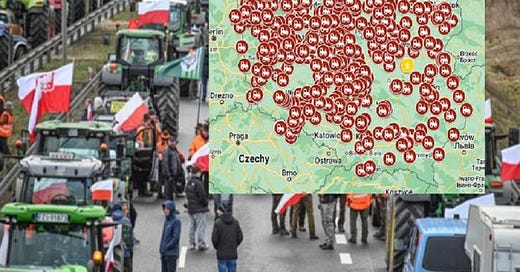It’s very likely that their protests will keep growing and could continue morphing into a new Solidarity movement that poses a serious challenge to the government.
An estimated 70,000 protesters blockaded around 570 locations in Poland this week in the largest demonstrations thus far in support of their farmers, whose livelihoods are on the brink of ruin due to the continued influx of cheap and low-quality Ukrainian grain into the domestic market. The EU’s provisional decision to cap some Ukrainian grain at the average 2022-2023 volume levels importantly excluded wheat and barley, and tariff exemptions on all imports will remain in place for another year.
Bloomberg then reported the day after that “Europe’s Support for Ukrainian Wheat Gets Farmers Even Angrier” since this preliminary measure doesn’t address their concerns. EU Commissioner for Agriculture Janusz Wojciechowski also said last week that Polish agriculture is losing on trade with Ukraine. He’s Polish and a member of the former conservative-nationalist government that imposed restrictions on Ukrainian imports but has come under pressure from the new liberal-globalist government to resign.
Regarding the incumbent authorities, they’re now trying to distract the protesters by pushing through an EU proposal to tariff Russian agricultural imports in response to a Ukrainian influence operation falsely alleging that these low-level imports are responsible for the farmers’ plight. This analysis here covers the various dimensions of their anti-Polish information warfare campaign since the protests resumed in January for those who are interested in learning more about this meddling.
The importance in referencing this is to inform the reader of why Poland supports a proposal that even Politico admitted is “more of a distraction than a real solution to the difficult economic situation facing European farmers, given the relatively low share of the EU market accounted for by (Russian) imports.” Ukraine’s APK-Inform Analytic and Information Agency also boasted that “Tariffs for Russian grain to boost Ukrainian wheat competitiveness in EU market”.
The EU’s impending Russian agricultural distraction is therefore a sly way to expand Ukraine’s share of the bloc’s market, which will only worsen the problems for Polish farmers, thus risking the scenario of their protests morphing into a modern-day form of the Old Cold War-era Solidarity movement. It was assessed earlier this month here that Poland’s new liberal-globalist government might then feel pressured to conventionally intervene in Ukraine as the ultimate distraction from these protests.
To be sure, the decision to do so wouldn’t be entirely driven by domestic matters, but they’d likely play an outsized role in convincing policymakers in the scenario of a new Solidarity movement rising. On-the-ground developments in the NATO-Russian proxy war would be much more influential such as the possibility of France preemptively trying to seize control of Odessa before a Russian breakthrough. Nevertheless, the point is that potential Polish participation could serve to distract from these protests.
Since the EU’s approach towards Russian and Ukrainian agricultural imports won’t help Polish farmers but will actually worsen their plight, it’s very likely that their protests will keep growing and could continue morphing into a new Solidarity movement. In that event, martial law could be imposed on the pretext of conventionally intervening in Ukraine and naturally needing to clear all blockades impeding the movement of troops there, thus killing two birds with one stone.
The aforementioned policy could backfire if the protesters refuse to comply and instead end up clashing with the armed forces, however, which could complicate this campaign at its most sensitive stage. Its success couldn’t be taken for granted then due to complexity theory teaching that initial conditions disproportionately shape the outcome of complex processes such as this one. The liberal-globalist government’s possible solution to the protests might therefore spark Poland’s worst-ever national crisis.




